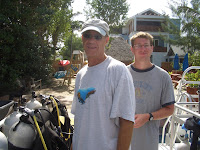I think it’s safe to say that this blog’s title is a bit of
a misnomer. It’s called Global Business Leadership because I had this crazy
idea that it’s what I would be writing about when I started the blog. Then, I
found that I simply enjoyed posting my sometimes snarky travel stores so much
more. The blog got more and more global but had almost nothing to do with
business and even less to do with leadership. Its name should have been changed
long ago. And it probably would’ve been. If not for the pesky problem of what
to call it now.
 To take it one step further, this post isn’t even that
global. It has to do with where I’m from – The San Gabriel Valley. It was the place where I grew up, went to
school, and hung out with friends. Life
was just that: plain, normal, life.
To take it one step further, this post isn’t even that
global. It has to do with where I’m from – The San Gabriel Valley. It was the place where I grew up, went to
school, and hung out with friends. Life
was just that: plain, normal, life.
I first heard about the 626 Night Market last year in Poland. It was new. But it didn’t
seem like it was especially out of the ordinary. I thought of it as a local
phenomenon. For that reason – That, and two tiny obstacles called The
Atlantic Ocean and North America—I’ve been aware of it for over a year
without attending.
I went last weekend. I’ve been to night markets in Maldives
and Thailand. You learn to force your way through the crowds. Admire strange
new snacks. And that its usually best to try said delicacies before asking what
they are. So that was nothing new. I noticed something that did surprise as I happily
munched my way through octopus balls and chicken harts: Other white people. Most
of my friends from the area are Asian. I’m used to being the only round eye at
most of the locales we frequent. This was no longer the case. I felt slightly weirded-out.
Something had changed.
 Apparently what I thought of as normal became a ‘thing’
while I was gone. The great expanse between LA and the Inland Empire is now referred
to as ‘The 626’.I’ve heard what goes on here has a name: the ‘boba life’ (Seriously?). So, I guess I’ve
been living on the periphery of it as much as possible to without even liking
tea or tapioca.
Apparently what I thought of as normal became a ‘thing’
while I was gone. The great expanse between LA and the Inland Empire is now referred
to as ‘The 626’.I’ve heard what goes on here has a name: the ‘boba life’ (Seriously?). So, I guess I’ve
been living on the periphery of it as much as possible to without even liking
tea or tapioca.
Whatever you decide to call it, people are curious. And that’s
what has changed. Asians remain the clear majority at the night market. Yet, It’s
one of the few markets anywhere where you can see people of every race brought together
by a common love of food.
It’s changed things at home too. For better or worse, my
parents want to know about it. We’ve lived here for years. But, I had no idea
how much they didn’t know about our surroundings. Now I’m getting questions like “What is boba?”
and “Have you eaten this Korean barbecue?” mixed in with “What were you guys up
to yesterday?” Well, umm…let’s see here…
Whatever people don’t know, they’re learning. Some are
shocked a la ‘You seriously want me to eat cow’s tongue?!’But I think most
are also impressed by the uniqueness of it. Some are starting to come in
numbers. Like I saw at 626 night market, that changes it. Blends with it. Globalizes
it. Dumbs it down? I don’t know. But, maybe in that sense this post is global
after all.
You can call it whatever you like. You can give it a name. Make
it a phenomenon. Call it something new and unique. But to me it will always be just the way things are. The experiences
I’ve had. The label doesn’t matter. The
content counts. Whatever it may become.





















